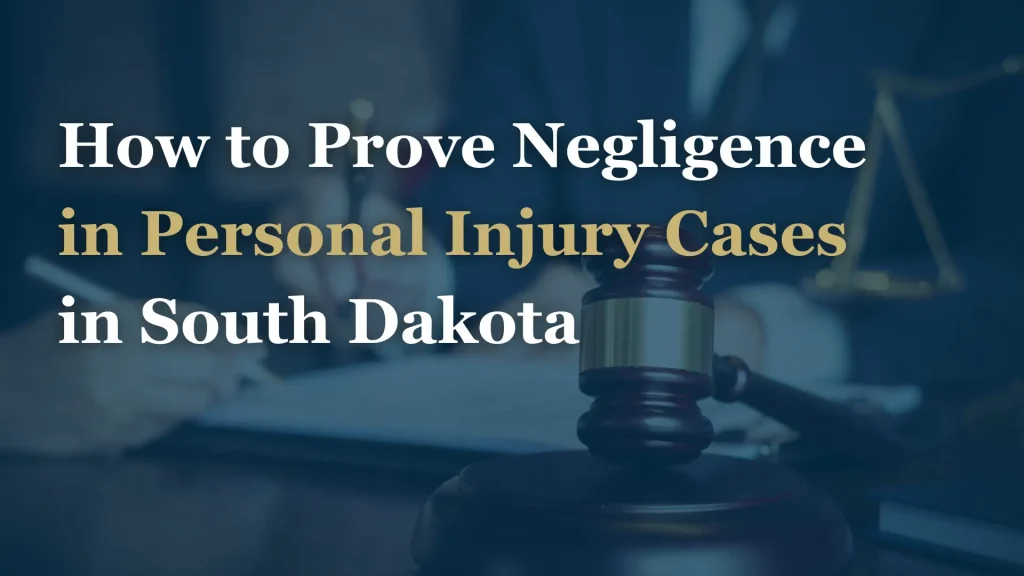 You might have the right to seek compensation if you get hurt due to someone else’s carelessness. But it’s not just about proving you were injured—you must also show that someone else was at fault. Most personal injury cases rely on proving negligence in personal injury to hold the at-fault party accountable.
You might have the right to seek compensation if you get hurt due to someone else’s carelessness. But it’s not just about proving you were injured—you must also show that someone else was at fault. Most personal injury cases rely on proving negligence in personal injury to hold the at-fault party accountable.
In South Dakota, specific legal rules can affect your case. This guide breaks down what negligence is, the evidence you will need, and how South Dakota’s laws could impact your claim. What qualifies as a personal injury is also essential when building your case.
What Is Negligence in Personal Injury Cases?
When someone does not act responsibly and another person gets hurt as a result, the irresponsible person is negligent. In a personal injury case, proving negligence means showing that the person did not take suitable steps to prevent harm and that this led to the injury.
To win a negligence case, you have to prove four main things:
- Duty of Care – The at-fault party had a duty to act in a way that wouldn’t harm others. For example, drivers must follow traffic laws and drive safely to avoid accidents.
- Breach of Duty – The at-fault party neglected their duty of care, whether by texting while driving, running a red light, or failing to clean up a spill in a store, ultimately causing someone to get hurt.
- Causation – Their breach of duty directly caused your injuries. In other words, you would not have been hurt if they had not been careless.
- Damages – You suffered actual harm, whether medical bills, lost wages, or pain and suffering.
Common Examples of Breach of Duty of Care
A breach of duty happens when someone does not take the level of care the law expects. It is not just a mistake—it is negligence. A driver blows through a stop sign? Negligent. A business fails to clean up a wet floor or post warning signs about the spill, knowing someone could slip?
A doctor skips the standard tests a similarly trained doctor would order in the same circumstances and misses a serious diagnosis? Negligent. A landlord refuses to fix a broken staircase after complaints. Negligent. And when that negligence leads to harm, they can be held responsible.
South Dakota’s Unique Comparative Negligence Rule
Every state has its way of handling negligence cases. South Dakota is one of the few states that uses the “slight/gross” comparative negligence system. You can only recover damages if your negligence is considered “slight” compared to the other party’s “gross” negligence.
What does that mean in real-world terms? Let’s say you were in a car accident, and the other driver was speeding, but you were also slightly distracted. If a jury decides your fault was more than “slight,” you might not be able to recover damages at all.
Since “slight” and “gross” are subjective, courts and juries must make judgment calls, making strong evidence and a concrete legal argument even more important.
Evidence Required to Prove Negligence
Winning a negligence case depends on presenting solid evidence that supports your claim. The more proof you have, the better your chances. Here are some key types of evidence that can help:
- Accident Reports – Although not allowed in court, police or official reports can be key evidence in your insurance claim, including statements, witness names, and fault assessments.
- Medical Records—These show the extent of your injuries and help connect them to the accident. If you waited weeks to see a doctor, the other side might argue that your injuries were not that serious or were not caused by the incident.
- Photos and Videos – Pictures of the accident scene, property damage, injuries, and anything else relevant can serve as solid evidence. Surveillance footage (if available) can also be valuable.
- Witness Statements – Testimony from people who saw what happened can support your version of events.
- Expert Testimony – Specialists like doctors or accident experts clarify technical details to support your case.
- Receipts and Financial Records – Proof of lost wages or expenses strengthens your claim.
Collecting this evidence as soon as possible is paramount. Over time, physical proof may be lost, witnesses’ memories become less reliable, and essential records may be more challenging.
How to Gather Evidence for Your Injury Claim
 The stronger your case, the easier it is to prove negligence. If you are injured because of someone else’s carelessness, here is what you should do:
The stronger your case, the easier it is to prove negligence. If you are injured because of someone else’s carelessness, here is what you should do:
- Document Everything – Take photos of the accident scene, injuries, property damage, and anything else that might be relevant.
- Get Witness Information – If someone saw what happened, ask for their contact details if you need a statement later.
- Seek Medical Attention Immediately – Even if you do not feel seriously injured, get checked out by a doctor. Some injuries do not show symptoms right away.
- File an Accident Report – If the police or a property owner (like a store manager) files a report, get a copy.
- Keep Track of Expenses – Hold onto medical bills, receipts for prescription medications, and records of lost wages.
- Consult an Attorney – A personal injury lawyer can help gather evidence, negotiate with insurance companies, and prepare your case for court if necessary.
The sooner you take these steps, the better your chances of preserving valuable evidence.
The Role of a Personal Injury Attorney
Proving negligence is not always easy, especially in South Dakota, where the laws differ from those in other states. That is why having a personal injury lawyer is essential. They will look into your case, collect evidence, deal with insurance companies, keep track of deadlines, and even represent you in court if needed. If you have been hurt because of someone else’s negligence, getting legal advice can help you understand how damages are determined and protect your rights.
Building a Strong Case Starts Now
Proving negligence in a personal injury case takes solid evidence and a good grasp of the law. If you have been hurt, acting fast is essential—gathering evidence early gives you a better shot at getting compensation for medical bills, lost wages, and other costs. Our personal injury lawyers in Watertown can walk you through the process and fight for what you are owed. Our team can assist you with these cases and help you with the process. For advice on your case, contact Turbak Law Office, P.C. at 605-886-8361 or contact us online today.